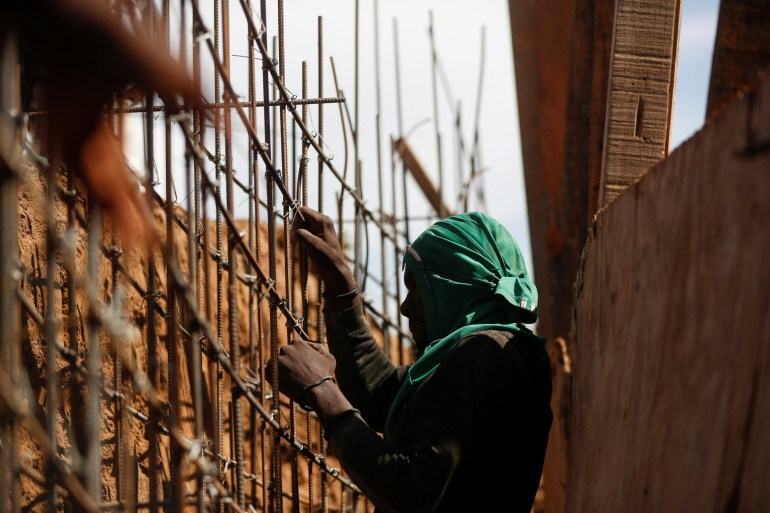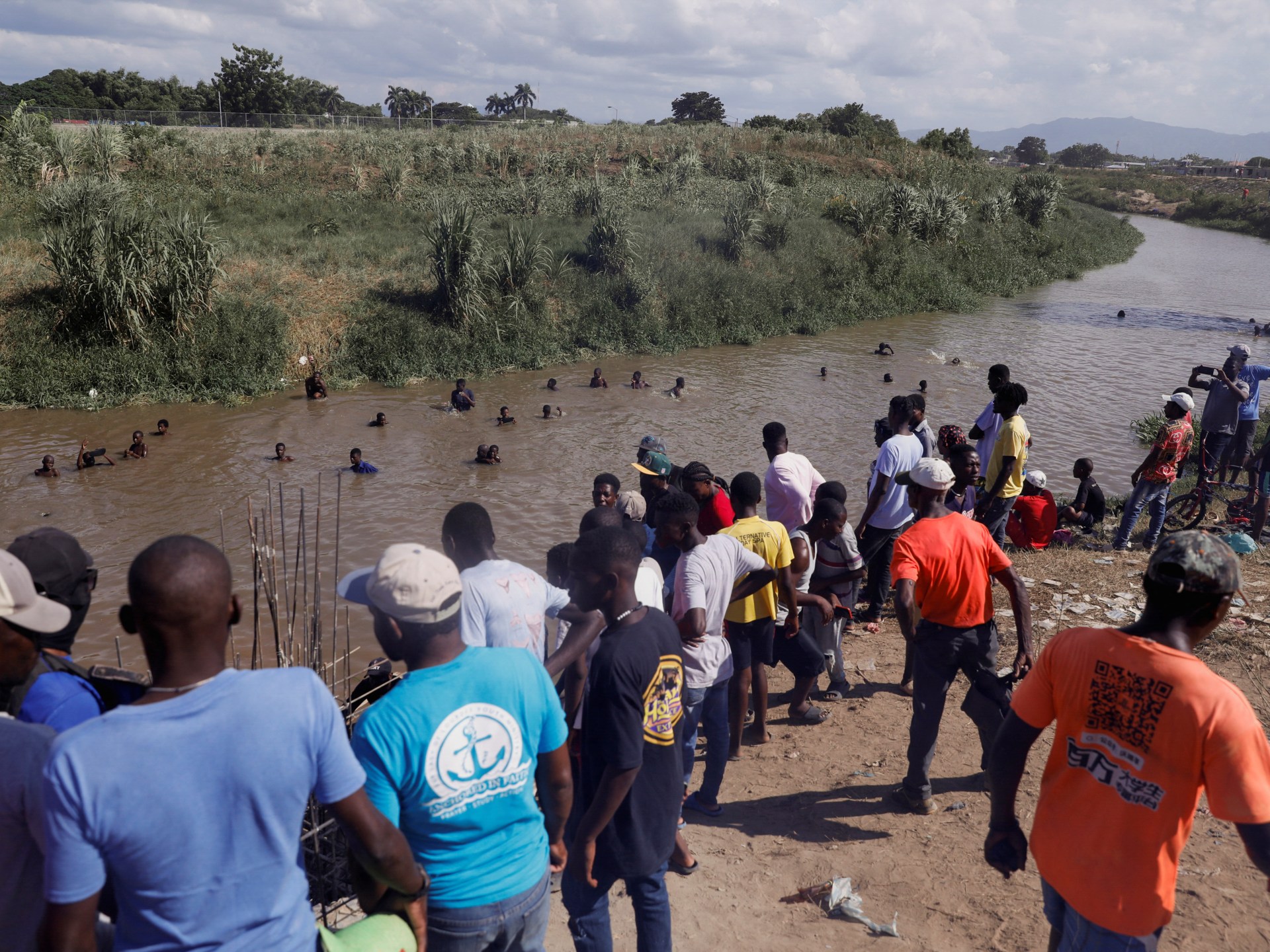Dajabon, Dominican Republic – It is a scene that repeats itself at the Dominican Republic border town of Dajabon twice a day: A queue of Haitians fills the street, trailing across a couple of blocks and ending at a crossing where soldiers are stationed.
From there, they cross a border bridge on their way home to Haiti, the country with which the Dominican Republic shares an island.
They come carrying mattresses, clothes baskets, suitcases and cardboard boxes. Anything that can hold the possessions they’ve built up during a stay that for some has lasted for years in the Dominican Republic.
They’re going voluntarily. Sort of. Most of the Haitians that we spoke to say they have faced pressure or harassment from Dominican security forces to leave.
Their departure coincides with not just renewed but increased tensions between the two countries.
Last week, the Dominican Republic announced it would close all ports of entry to Haiti in response to an escalating water dispute. Now, border traffic is only allowed twice a day and in one direction: back to Haiti.
My reporting team and I meet Atkinson in the queue. He has two large bags and a portable crib with him. The crib is where his one-year-old boy — currently in the arms of his partner — usually sleeps. He has a three-year-old girl as well, who stands shyly beside him. And a car, too. But he’s had to leave it behind.
Atkinson says he was a taxi driver in the Dominican Republic for 19 years. But after hearing stories of the Dominican army breaking into Haitian homes at night and transporting families to the border with nothing, he has decided to leave of his own accord. At least this way he can take what few possessions he can carry.
Still, he’s grateful for his time in the country. “I give thanks to all the Dominican presidents that have gone before because none of them, in the 19 years I’ve had in the country, have treated us like this one. I hope that God touches the heart of this president, this government, because they can’t treat human beings like this.”
Atkinson is talking about President Luis Abinader. Since he was elected in 2020, Abinader has taken pride in his hard line against Haiti, which is much poorer than its neighbour and frequently sends migrants across the border.
Last year, his government doubled the number of deportations of Haitians and announced a wall between the two countries.
Now, Abinader has closed the border completely over a canal that Haitian farmers were building on the shared Massacre River. His government said the canal violated a treaty and would disadvantage Dominican farmers.
But the drastic action prompted the Haitian government on Thursday to announce its support for the canal and pledge to follow through with its completion.
All the while, in the Dominican Republic, Haitian migrants have reported intimidation from security forces. Romana Charly told us that police and migration kicked her and her four children out of her living space in the middle of the night three times in a single week.
Eventually, instead of returning home and facing more of the same harassment, she said she decided to leave the Dominican Republic entirely. Charly had spent more than 20 years in the country.
“They grabbed us when we were sleeping and threw us out with clothes and everything. They hit us and threw around the boys,” Charly explained as she waited in the queue, one of her children in her arms.
We set off from the border to Partido, a Dominican community where Haitians work in local agriculture, to meet more of the migrant population. There, we encountered Tatiana, who said she is seven months pregnant and hides in a field at night to escape the army’s attention.
“Now I have to sleep in the open. We’re paying for the room, but I can’t sleep in there,” she said, as she looked out at the field, next to the buildings where she rents a room. Cows looked back from the darkness. Beyond them were trees and bushes, spaces to wait out any possible nighttime visits from the Dominican army.
“I don’t sleep,” she told me.
Several other Haitian migrants in Partido also told us that soldiers had come for them in the night. It is something that the locals we talked to either rejected or minimalised. Many of them support the president’s actions and called the situation at the border a “mess”, even if they sympathised with the Haitians’ plight.
The army itself rejected our request for comment. The immigration ministry didn’t reply at all.
But the border closure is not just about migration. It’s about trade. Food. Hunger. Some Haitians depend on travel to the Dominican Republic for food they simply cannot get back home. According to a May report from the United Nations, nearly half of the Haitian population is going hungry.
Not being able to sell food to Haiti is a problem for Dominican traders, too. Last year, approximately $1bn worth of Dominican exports were sent to Haiti.
Now that the borders are shut, the Dominican government has pledged to buy up perishable goods that businesses can no longer sell across the border. But I asked the country’s industry and commerce minister, Ito Bisono, how long it could afford to do that.
“The limit of time doesn’t depend on us,” Bisono answered. “It depends on Haiti. We hope that the talks advance and we continue to reposition our products internally.”
He added that the country is also looking towards other markets for its products. He mentioned the possibility of sending its eggs to Panama, for example.

At a press conference in Dajabon, many of the business leaders we heard seemed prepared to support the government in its actions. But the question is: For how long?
Experts have questioned whether the canal in Haiti can actually be stopped, as Dominican authorities have demanded.
For years, the Haitian government has been in disarray. Approximately 80 percent of its capital, Port-au-Prince, has fallen into the hands of gangs, as Haitian Prime Minister Ariel Henry appeals to international forces for help regaining control.
And even if the government could stop the canal diggers, it has shown no desire to do so. Earlier this month, the Haitian government said the country has the full right to take water from the Massacre River. On Thursday, it went even further, saying that the canal “MUST BE BUILT”.
Meanwhile, the canal has turned into an object of national pride, even defiance, for Haitians. Among the Haitians we spoke to, a frequent question arose: If the Dominican Republic has water projects on its side of the river, why Haiti can’t have one?

Our roving video reporter Yvon Viliers saw flags flying around the canal site. People turned up by bus to help the canal diggers. Others brought food.
One of the arrivals, Zephire Magdalie, spoke to Viliers as she distributed food from a truck.
“We come to support the canal being built because we are Haitians. We must cooperate among ourselves to give food to those who work at the canal,” Magdalie said.
Whether that popular support will continue is an open question, particularly as shortages mount as a result of the border closure. What seems certain, however, is that the situation will harm both countries’ economies if it continues for a significant amount of time.
That, in turn, puts President Abinader in an interesting predicament as he faces reelection next year. Does he dig in for the long haul, whatever the economic cost? Or rescind his closure of the border? The tides of public opinion may decide the outcome.
